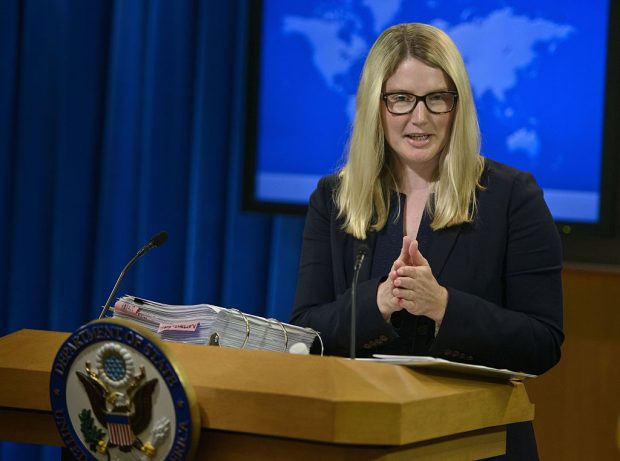WaPo: The Obama administration believes that about 12 detainees released from the prison at Guantanamo Bay, Cuba, have launched attacks against U.S. or allied forces in Afghanistan, killing about a half-dozen Americans, according to current and former U.S. officials.
In March, a senior Pentagon official made a startling admission to lawmakers when he acknowledged that former Guantanamo inmates were responsible for the deaths of Americans overseas.
The official, Paul Lewis, who oversees Guantanamo issues at the Defense Department, provided no details, and the Obama administration has since declined to elaborate publicly on his statement because the intelligence behind it is classified.
But The Washington Post has learned additional details about the suspected attacks, including the approximate number of detainees and victims involved and the fact that, while most of the incidents were directed at military personnel, the dead also included one American civilian: a female aid worker who died in Afghanistan in 2008. The officials, who spoke on the condition of anonymity to discuss a sensitive matter, declined to give an exact number for Americans killed or wounded in the attacks, saying the figure is classified.
[Pentagon official: Release of Guantanamo detainees has led to American deaths]
Lewis’s statement had drawn scrutiny on Capitol Hill, where some lawmakers see the violence against Americans as further evidence that the president’s plans for closing the prison are misguided and dangerous. They also describe the administration’s unwillingness to release information about the attacks as another instance of its use of high levels of classification to avoid discussion of a politically charged issue that could heighten political opposition to its plans.
One U.S. official familiar with the intelligence said that nine of the detainees suspected in the attacks are now dead or in foreign government custody. The official would not specify the exact number of detainees involved but said it was fewer than 15. All of them were released from Guantanamo Bay under the administration of George W. Bush.
The official added: “Because many of these incidents were large-scale firefights in a war zone, we cannot always distinguish whether Americans were killed by the former detainees or by others in the same fight.”
Military and intelligence officials, responding to lawmakers’ requests for more details, have provided lawmakers with a series of classified documents about the suspected attacks. One recent memo from the National Counterterrorism Center (NCTC), which was sent to the House Foreign Affairs Committee after Lewis’s testimony, described the attacks, named the detainees involved and provided information about the victims without giving their names.
But lawmakers are prohibited from discussing the contents of that memo because of its high classification level. A similar document provided last month to the office of Sen. Kelly Ayotte (R-N.H.), a vocal opponent of Obama’s Guantanamo policy, was so highly classified that even her staff members with a top-secret clearance level were unable to read it.
“There appears to be a consistent and concerted effort by the Administration to prevent Americans from knowing the truth regarding the terrorist activities and affiliations of past and present Guantanamo detainees,” Ayotte wrote in a letter to Obama this week, urging him to declassify information about how many U.S. and NATO personnel have been killed by former detainees.
Rep. Edward R. Royce (R-Calif.), who chairs the House Foreign Affairs Committee, has also written legislation that would require greater transparency surrounding the transfer of Guantanamo detainees.
Royce and Ayotte are among the lawmakers who opposed a road map for closing the prison that the White House submitted to Congress earlier this year. That plan would require moving some detainees to U.S. prisons and resettling the rest overseas.
“The administration is releasing dangerous terrorists to countries that can’t control them, and misleading Congress in the process,” Royce said in a statement. “The president should halt detainee transfers immediately and be honest with the American people.”
Just under 700 detainees have been released from Guantanamo since the prison opened in 2002; 80 inmates remain.
Secrecy about the top-security prison, perched on an inaccessible corner of Cuba, is nothing new. The Bush administration for years refused to provide a roster of detainees until it was forced to do so in a Freedom of Information Act case in 2006. To this day, reporters have never been able to visit Camp 7, a classified facility that holds 14 high-value detainees, including the five men on trial for organizing the Sept. 11, 2001, attacks.

Both the Bush and Obama administrations have provided only limited information on current and former detainees; most of what the public knows about them comes from defense lawyers or from documents released by WikiLeaks.
According to a 2012 report from the House Armed Services Committee, the Defense Intelligence Agency ended the practice of naming some suspected recidivists in 2009 when officials became concerned that it would endanger sources and methods.
National Security Council spokesman Myles Caggins said it was difficult to discuss specific cases in detail because the information was classified.
“But, again, we are committed to being forthcoming with the American people about our safe and responsible approach to Guantanamo detainee transfers, including about possible detainee re-engagement in terrorist activities,” he said.
One Republican aide who has reviewed the classified material about the attacks on Americans said the information has been “grossly overclassified.”

Administration officials say that recidivism rates for released Guantanamo inmates remain far lower than those for federal offenders. According to a recent study, almost half of all federal offenders released in 2005 were “rearrested for a new crime or rearrested for a violation of supervision conditions.” Among former Guantanamo detainees, the total number of released detainees who are suspected or confirmed of reengaging is about 30 percent, according to U.S. intelligence.
Nearly 21 percent of those released prior to 2009 have reengaged in militancy, officials say, compared with about 4.5 percent of the 158 released by Obama.
Human rights activists say the statistics are suspect and cannot be verified because the administration provides almost no information about whom it is counting and why.
Most of those suspected of re-engagement are Afghan, reflecting the large numbers of Afghans detained after the Sept. 11 attacks and the ongoing war there. More than 200 Afghan prisoners have been repatriated from the prison.
Officials declined to identify the woman killed in Afghanistan in 2008. But there are two female aid workers killed that year who might fit the description.
Cydney Mizell, a 50-year-old employee of the Asian Rural Life Development Foundation, was abducted in Kandahar as she drove to work. Her body was never recovered, according to a former colleague who said he was told about a month later that she had died.
Another woman, Nicole Dial, 30, a Trinidadian American who worked for the International Rescue Committee, was shot and killed the same year south of Kabul, along with two colleagues.
Relatives of Mizell and Dial said they have not been in touch with the FBI for years. Dial’s brother said he was unaware of a former Guantanamo detainee being involved in his sister’s killing.
Mizell’s stepmother said she was never told the exact circumstances of her daughter’s death or who abducted her.
“She was definitely killed,” Peggy Mizell said. “I figured she was shot.”
While largely ignored by the media, the Clintons have their own university scandal. Donald Trump has been rightfully criticized and sued over his defunct Trump University. There is ample support for claiming that the Trump University was fraudulent in its advertisements and operations. However, the national media has been accused of again sidestepping a scandal involving the Clintons that involves the same type of fraud allegations. The scandal involves the dubious Laureate Education for-profit college and entails many of the common elements with other Clinton scandals: huge sums given to the Clintons and questions of conflicts with Hillary Clinton during her time as Secretary of State. There are distinctions to draw between the two stories, but the virtual radio silence on the Clinton/Laureate story is surprising.





